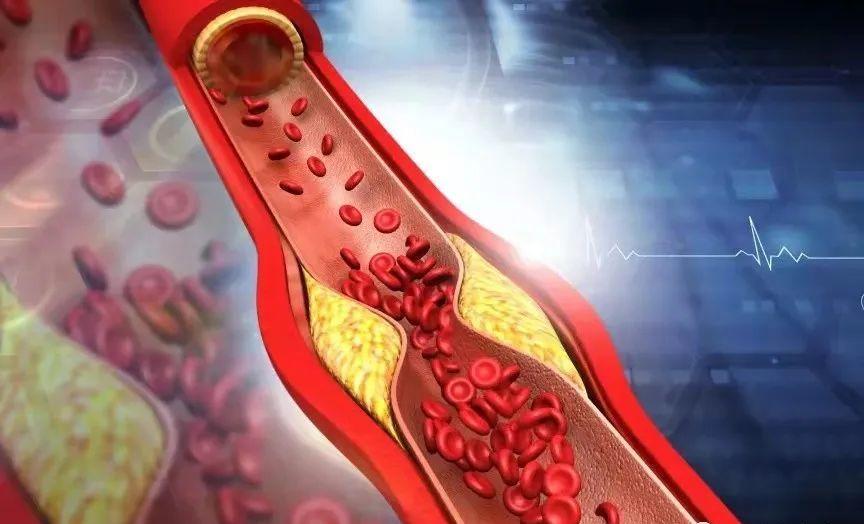According to the latest statistics of the National Cardiovascular Disease Center, the number of people with dyslipidemia in China has exceeded 400 million.
Dyslipidemia mainly includes high cholesterol and high triglycerides, especially high cholesterol is a greater threat to health.
High cholesterol refers to the elevation of low-density lipoprotein (LDL), which will cause cholesterol to be deposited into the inner wall of blood vessels, forming atherosclerotic plaques, which over time will induce blood vessel blockage, resulting in cerebral infarction, coronary heart disease and peripheral vascular disease, which has become the first cause of death in China.

Cholesterol is also good or bad
People often hear about good cholesterol and may want to take in more good cholesterol. In fact, dietary cholesterol is not the same as blood cholesterol because dietary cholesterol is a complex lipid that cannot be easily distinguished as good and bad.
And we often refer to blood cholesterol refers to lipoproteins composed of lipids and proteins, which are good and bad.
LDL, also known as bad cholesterol, its role is to transport cholesterol and lipid components in the liver to the inner wall of blood vessels for deposition, gradually forming atherosclerotic plaques, resulting in atherosclerosis and eventually causing vascular disease.
HDL, also known as good cholesterol, its role is exactly the opposite of LDL, it transports the cholesterol and lipid components deposited in the inner wall of blood vessels to the liver for storage, thereby alleviating atherosclerosis and reducing the risk of vascular diseases.
Therefore, for the sake of good health, for the sake of vascular health, we must find ways to increase the level of HDL and reduce the level of LDL.
Lowering cholesterol and improving the way you eat are key
Although only 20% of cholesterol comes directly from food, and 80% of cholesterol is synthesized by the liver itself, the raw material for liver synthesis cholesterol (saturated fat) also comes from food.
Therefore, for patients with hypercholesterolemia, in addition to reducing the intake of cholesterol in the diet, it is also necessary to reduce the intake of saturated fat (bad fat).
Harvard Medical School has published an authoritative cholesterol-lowering book, which has 5 suggestions on diet, which is worth learning
First, avoid consuming too much saturated fat
One of the characteristics of saturated fats is that they solidify at room temperature, and their main source is animal fats, and some plant fats also contain saturated fats.
Because saturated fat will make the blood more easily coagulated, it will induce diseases such as arteriosclerosis, cerebral infarction, coronary heart disease, and promote the synthesis of cholesterol in the liver, resulting in a rise in the level of bad cholesterol in the blood, and its adverse effects far exceed excessive dietary cholesterol.
Recommendation: Eat less red meat (beef, pork, lamb) and less processed meats such as lunch meat, sausages, and bacon.
When eating meat, peel and fatten, and replace fat with lean meat.
Also eat less foods rich in coconut or palm oil.
Second, avoid trans fats
Trans fat is a type of fat that is worse than saturated fat, and it is widely found in daily foods.
Trans fats originate from the process by which edible oil is converted from liquid to solid after being hydrogenated to prolong the shelf life of food and increase taste.
Trans fats not only lead to an increase in the level of bad cholesterol in the blood, but also reduce the level of good cholesterol, which greatly increases the risk of vascular disease.
Trans fats are mainly found in cream cakes, hamburgers, fried chicken wings, sandwich biscuits, puff pastry tarts, donuts, popcorn, etc., so be sure to eat less.
It is also necessary to remind everyone that when shopping ultrasound, look at nutrition labels and try to avoid foods made of hydrogenated vegetable oil, shortening, hydrogenated fat, and margarine.
Third, reduce foods with high cholesterol
Although only 20% of the cholesterol in a healthy body comes from dietary cholesterol, for middle-aged and elderly friends or patients with hypercholesterolemia, it is recommended to reduce the intake of dietary cholesterol, such as animal brains (such as pig brain, sheep brain, cow brain), animal offal (such as pig liver, pig lung, pig intestine), egg yolk, squid, shellfish, cream, butter, etc.
It should be reminded that egg yolks contain high cholesterol, but also contain lecithin, lecithin helps to reduce the absorption of cholesterol, and the cholesterol of egg yolks belongs to large particles and has no obvious effect on LDL in the blood. Therefore, the vast majority of people eat 1 to 2 eggs a day is OK, to steamed, boiled eggs, eat less fried eggs.
Fourth, consume more unsaturated fats
Unit unsaturated fats can reduce the level of bad cholesterol in the body and promote blood circulation, and polyunsaturated fats can reduce the level of total cholesterol in the blood.
Unsaturated fats are good fats, mainly from vegetable oils, legumes, nuts, and fish.
When cooking, it is recommended to use vegetable oils with high unsaturated fat content, such as olive oil, peanut oil, rapeseed oil, etc.
Fifth, consume more dietary fiber
Dietary fiber is essential for regulating cholesterol levels.
Dietary fiber can be combined with cholesterol and promote excretion from the body, helping to lower levels of cholesterol in the blood.
Dietary fiber is mostly found in oats, sweet potatoes, legumes, corn, vegetables, and fruits.